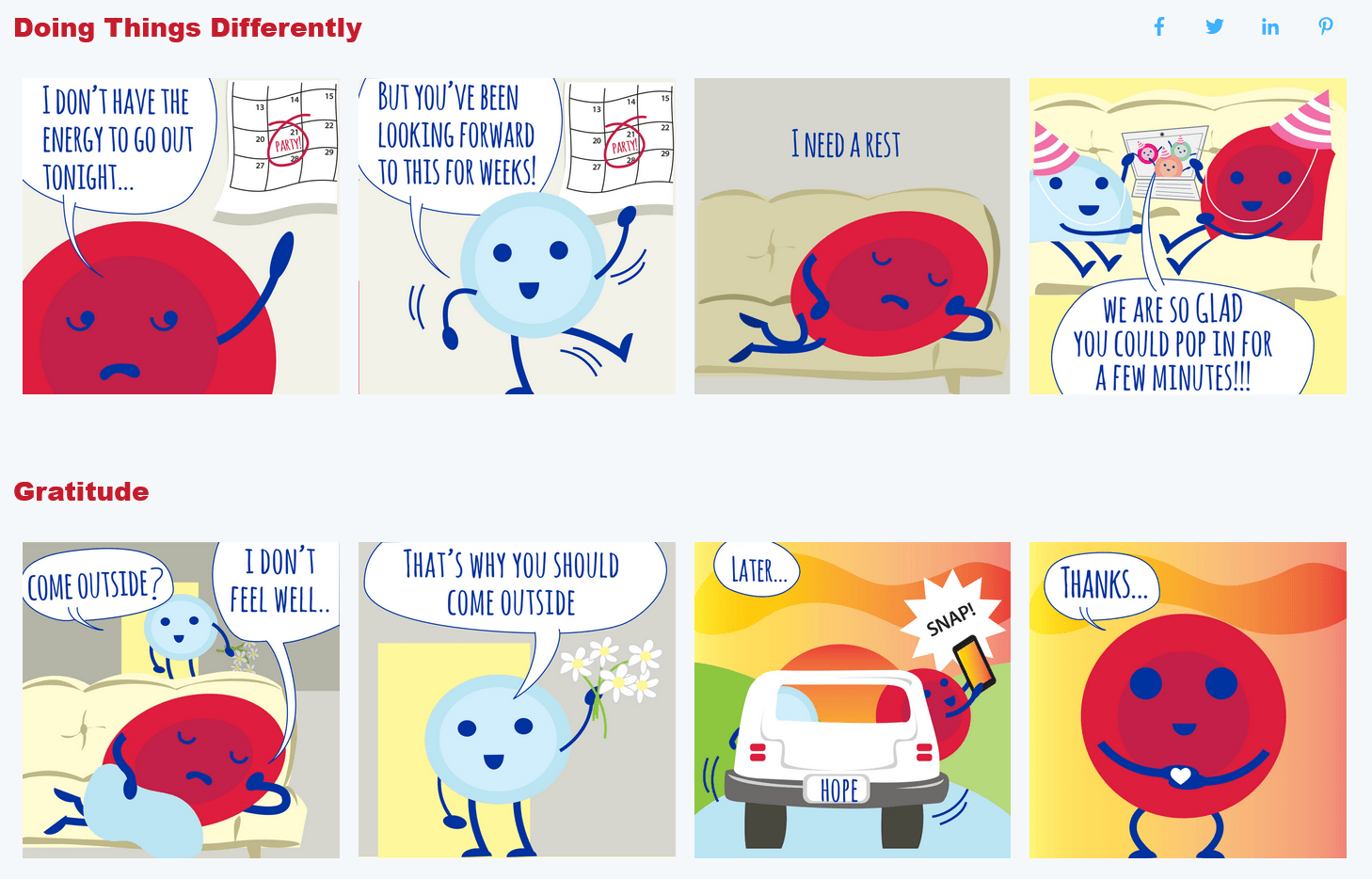CPFF research investment surpasses $2 million
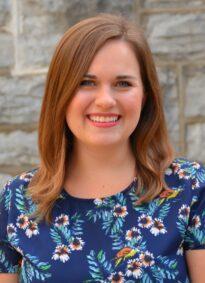
With the awarding of the 2023-2024 CPFF Robert Davidson Fellowships, the foundation’s investment in research totals $2.16 million, more than doubling during the last five years. It also brings our total number of research projects and fellowships funded to 47.
“Our sincere thanks go to our sponsors and individual donors for making it possible for us to continue to fund the training of more ILD specialists, which means better access to care,” says Sharon Lee, CPFF Executive Director. “And, we gratefully acknowledge the contributions of our previous fellows and their mentors, whose research efforts have advanced our collective knowledge of pulmonary fibrosis, for the benefit of all.”
The Canadian Pulmonary Fibrosis Foundation (CPFF) is very pleased to announce this year’s two, $90,000 fellowships to Dr. Alec Campbell (for his second year of a two-year fellowship) and Dr. Kirsten Nesset (for a one-year fellowship). Read on for a brief summary of their upcoming work.
Dr. Alec Campbell
For the second year of his two-year fellowship, Dr. Campbell will continue working with Dr. Chris Ryerson and Scott Tebbutt, PhD, at the University of British Columbia, and providing care to ILD patients at St. Paul’s Hospital in Vancouver, in addition to conducting his research. He will continue work on his research project examining the molecular interactions within individual cells, a technique known as single-cell RNA-sequencing (scRNAseq), to see if there are genetic markers in the blood that could help diagnose ILD earlier, more reliably, and more safely than is currently possible. You can read about Dr. Campbell’s work during the first year of his fellowship in the next article of this newsletter.
Dr. Kirsten Nesset
Dr. Nesset will undertake her fellowship at the Firestone Institute for Respiratory Health (FIRH) at McMaster University under the supervision of Drs. Martin Kolb, Nathan Hambly, Gerard Cox, and Ciaran Scallan. In addition to caring for FIRH patients, she will begin her studies in the two-year, part-time, online Master’s program in Health Professions Education through the Maastricht-Canada program at Western University. The bulk of her time (75 percent) will be spent as the lead investigator of a project exploring how frailty might impact patient engagement and satisfaction in remote monitoring programs.
You can read about the work of previous CPFF fellows on our website.
CPFF Robert Davidson Fellow makes progress on two research fronts
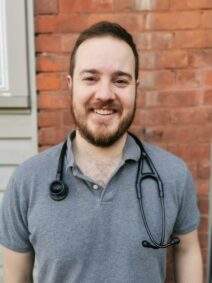
Dr. Alec Campbell has almost completed the first-year of his two-year CPFF Robert Davidson fellowship. During this time, he has cared for patients at St. Paul’s ILD clinic in Vancouver and taken the lead on two complex research projects. One involves the use of AI (artificial intelligence) to interpret CT scans and the other addresses genetic analysis of blood samples to aid in ILD diagnosis and treatment.
Tracking ILD progression using CT scans can be challenging as the human eye often misses subtle changes, which may be significant. One proposed solution is to use AI to recognize small changes that may precede more progression over time.
“For instance, it is very difficult to detect a one per cent progression in fibrosis on a CT scan by eye,” says Dr. Campbell, “yet, over time, one per cent progression every six months, or each year, adds up and can change our approach to treatment. In such a case, the specialist may choose to begin anti-fibrotic treatment earlier with greater benefit to the patient.”
Getting to the stage where we can use AI to analyze CT images means addressing many factors, including those that may account for differences in scans that are not due to disease progression. One of those variables is the volume of air that the patient has breathed in on any given scan. This volume can vary from day to day, even in patients who do their best to be consistent.
Dr. Campbell’s project addresses this factor. Studying a group of patients with SSc-ILD (systemic sclerosis ILD), he assessed what effect the measures of inspired (inhaled air) volume can have on different AI methods of looking at progression.
“We found that all measures we tested have a small but significant effect on different AI methods of assessing progression both from CT alone and when incorporating lung function testing,” he reports.
This research means that future work developing AI algorithms can take this variable into account and give more accurate estimates of the change due to progression. Dr. Campbell is very pleased to be presenting an abstract of his results at the 2023 American Thoracic Society conference in Washington, DC, later this month. He will also complete a manuscript of the study to submit for publication this spring or summer.
This work may also inform future research into other factors to consider in developing AI for CT analysis, such as the affect of the amount of fluid in the lungs or dense lung tissue. So, while it may be several years before AI can “read” CT scans, it is certainly possible, and will enable specialists to devote time to more patients, improving access to timely care.
Dr. Campbell’s second project is an ambitious and multi-year project to analyze the genetic signatures in blood samples from patients early in their disease to determine the combinations of genes that predict particular ILD disease, risks of progression and responses to treatment. Discoveries in this area will lead to more accurate diagnoses and “personalized” treatment, in the same direction that cancer treatments are moving.
In the past year, Dr. Campbell and his colleagues have rated and tested various technical tools, such as specific lab kits, to ensure that the data they acquire is useful long into the future. And, to date they have recruited about 40 per cent of the 75 patients they intend to enroll over the two-year project.
For now, all the patients involved in the study will be from Vancouver, since processing the sample requires some expertise. Once the blood sample is collected, it is processed to obtain a “library” of DNA. This is then sent for DNA sequencing and an analysis is done on the sequences.
Processing tool kits and sequencing services are getting more affordable, costing between $1,000 and $2,000 per patient.
“The eventual goal of such research is a tool that can tell us from a blood sample whether a patient is at risk of progression, and potentially which medications will be most effective for them,” says Dr. Campbell. “I’m very excited to continue this work into the next year of my fellowship!”
CPFF looks forward to hearing about the results of Dr. Campbell’s research in his second year of his fellowship and we will be sure to share them with our readers.
Are you an Alberta resident?
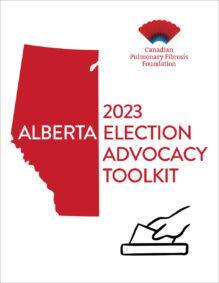
If so, you already know that the hotly contested Alberta general election will be held on May 29, 2023. The campaign period commenced on May 1 and will last 28 days. We’ve prepared an Alberta election toolkit to help our Alberta supporters communicate to all parties and candidates our recommendations for good public policy as it relates to pulmonary fibrosis (PF).
The toolkit outlines CPFF’s key messages and by printing off the handy one-pagers on pages 4-6, and sharing them with local election candidates in your riding and at local events like debates and townhalls, you can raise awareness of our cause during this critical election period.
You may also want to keep the one-pagers handy near your front door to share with any candidates canvassing in your neighbourhood. And don’t forget to answer your phone to election callers to discuss your concerns. It’s an easy way to raise PF’s profile among election candidates and political parties!
“It is only with the tremendous efforts of people like you that we can affect policy changes to improve life for people living with PF,” says Sharon Lee, CPFF’s Executive Director. “Your advocacy and willingness to engage with your candidates is just one way to achieve this.”
The toolkit also contains a list of several websites and online resources to learn more about the 2023 Alberta general election, including party candidates and policy positions, as well as local events such as townhalls and debates.
There is also a sample email to request a meeting with a candidate to share your story and tips on educating them about our cause during the meeting. If you can secure a meeting with a candidate, or address them at a community meeting, please let us know by emailing us at: [email protected]. This will help us build our contact list for future advocacy work in Alberta.
Good luck with your advocacy efforts and remember to vote.
Get ready, get set – to walk, roll and run
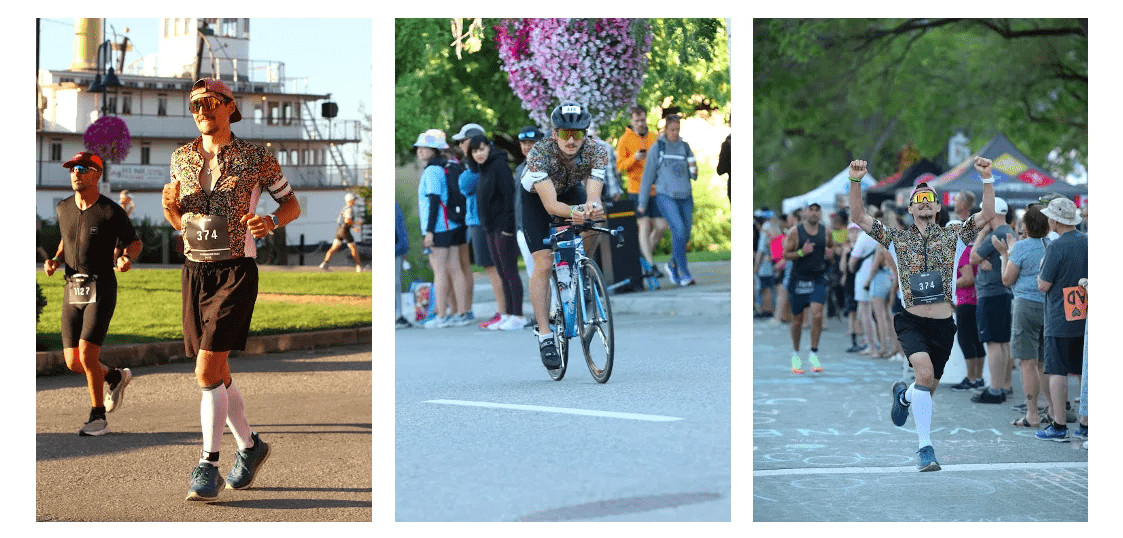
Our enthusiastic and energetic pulmonary fibrosis community is gearing up for a number of fundraising and awareness events taking place this summer and into Pulmonary Fibrosis Awareness Month this September. Take a moment now to check them out, learn more, and register to participate or sponsor a team and/or individuals.
In addition, everything is set up for the CPFF Virtual Walk, where you can register as an individual, or a team. Join Canadians from coast to coast as we to walk, roll, and run across the country, while staying in our own neighbourhoods – or in local parks or on nearby trails. Our goal is to collectively walk across Canada during the month of September 2023. That’s 6,818 kilometers! Everything you need to register and start getting friends, family, colleagues and neighbours to sponsor you is online.
You might want to consider starting up your own community walk. It’s not too late. We suggest that you keep it simple: a Community Walk, Roll, Run for pulmonary fibrosis is an inclusive, open-air activity that can be enjoyed by all. You don’t need to be a technical whiz to make this happen. Start by sharing your event details with CPFF via email ([email protected]) and we’ll create your event page. Next, recruit your participants, and ask them to register for the event as an individual or team. Then, start promoting your event.
We also have a 10-member team, the Warriors of Hope and an individual Tom Hunter on board to complete triathlons this summer, in support of the Canadian Pulmonary Fibrosis Foundation. They all welcome your encouragement and sponsorship.
At 60 years of age, Tom Hunter will be competing in the “Half Triathlon” at Mt. Tremblant on June 24, 2023. It’s an endurance test consisting of a 1.9 km. swim and a 90 km. bike ride, followed by a 21 km. run — all in one day!
Tom’s been doing these types of events for about 15 years now, after he found that just running was hard on certain parts of his body. “I find it’s less taxing on one area and easier physically. Also, there is a social aspect to triathlons being part of a training club,” he says.
Tom trains off and on through the year for these events, but it ramps up in the two months before a competition. Right now, he’s doing three runs, three swims and three bike rides a week. Yes, that means on two days a week the sessions are doubled up.
Why is Tom gathering pledges for this year’s triathlon? When his father was diagnosed with IPF, no one knew anything about the disease. “It was a difficult time for the family,” says Tom. “I want to help CPFF to raise awareness and help them provide support and resources to those living with this disease.”
Tom’s father passed away in 2016, so Tom is honouring his father, and everyone who is struggling to live with PF, with this effort. “It also aligns well to have the capacity to breathe and exercise in support of those who are challenged to just take a breath.”
Members of the Queen’s University varsity triathlon team have joined forces as the CPFF Warriors of Hope! Ten of them will help spread awareness and raise funds for pulmonary fibrosis while they compete in triathlon events in Toronto and Calgary.
The team is excited to collaborate with CPFF for one of the largest Canadian triathlon events of the summer — the Toronto Triathlon Festival (TTF). Most of the team members will run Olympic or Sprint distances for the triathlon on July 23rd, and everyone will be cheering for each other the whole way. Andres Moran-MacDonald will complete a similar event in Calgary on July 30th.
The Olympic Race is composed of a 1.5 km. swim, a 40 km. bike ride and a 10 km. run. The Sprint Race is composed of a 750-metre swim, a 20 km. bike ride and a five km. run. The Calgary Race is composed of a 1.9 km. swim, a 90-km. bike ride, and 21.1 km. run.
The CPFF Warriors of Hope are working with the Foundation to help raise money for, and awareness of, the awful disease that is PF. They are drawing attention to how healthy lungs can do so much, and how often we take them for granted.
It’s the team’s hope that by calling attention to pulmonary fibrosis, one day anyone who has it, can do anything they want — whether that is taking a walk or running a triathlon.
Every patient makes a contribution, says PF patient
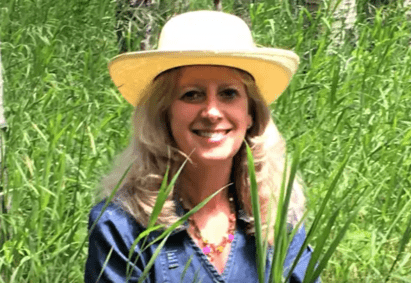
During her video interview with CPFF, pulmonary fibrosis patient Patricia Meadows, offers encouragement to others living with the disease. “Every patient is making a contribution. Even if you are in a wheelchair and on oxygen, the medical system is learning more and more about this terrible disease from our experiences,” she says.
This is something she has learned during the ten years she has lived with PF and been involved with CPFF’s Calgary Support Group, which she refers to as a “gift.”
When she first attended the support group, she finally felt like she was “seen” and there was validation of what she was going through. She describes not only the wonderful people she has met, but the wealth of knowledge she has gained, the emotional support that is offered, and the fun they have too – at events, out for coffee, or on a picnic.
“We support one another when a member passes away, but we also rejoice with those members who receive a lung transplant,” she says.
Patricia was fortunate to receive a timely diagnosis – five months after she noticed difficulty taking a full breath. She has PF from an auto-immune disease which attacked her lungs causing inflammation and scarring. Which auto-immune disease has still not been determined. She spent years on prednisone, which was very challenging.
Asked what she wants to tell the world about PF, she says, “We need to get the word out. Unless we wear oxygen, our disease can be invisible to others, but it is a life altering, if not life-ending, disease. And it affects not only the patient, but their community, family, friends, co-workers and the economy.”
CPFF interviewed Patricia at last year’s Clarke Family Walk in Calgary and she was thrilled to be part of the event in person once again. “This family that has had so much tragedy, has just opened their hearts and established this walk, not just for their family, but for the whole PF community. I am so proud to be a part of it.”
Researchers seeking survey participants

The University of Calgary is seeking people with pulmonary fibrosis (PF) over the age of 18 to complete a survey titled: Sexual function in patients with pulmonary fibrosis.
Pulmonary fibrosis (PF) can affect every area of a patients’ life, including having an impact on sexual activity. The researchers want to understand the changes PF may have on a person’s intimate sexual relationships. They will use this information to adapt care and help patients improve their quality of life.
The 10-minute, online anonymous survey, adapted by the University of Calgary’s Interstitial Lung Disease program from the Changes in Sexual Functioning Questionnaire, will ask you questions about pulmonary fibrosis and your thoughts and feelings about your sexual function. There will also be an opportunity to volunteer for a follow-up interview after submitting the survey. The study has been approved by the University of Calgary Conjoint Health Research Ethics Board.
Your participation is completely voluntary. The survey is anonymous and all data will be confidential. You can stop the survey at any time, by simply closing your internet browser and no data will be collected. We do not foresee any risks to patients or family members by participating in this project. The researchers have no conflicts of interests to declare, pertaining to this study.
If you are interested in completing the survey, please click here.
Please feel free to forward this article to other people with pulmonary fibrosis.
The researchers hope to learn whether sexual dysfunction is common in patients with PF, and to understand patients’ concerns and feelings around their sexual function. This newsletter will update you on the results of the study, when it is ready for publication, likely in 2024.
New Hope and Ollie messages
Hope and Ollie are back with gratitude and creative thinking on adjusting to a new normal. Visit the Hope and Ollie webpage to view previous comic strips.
